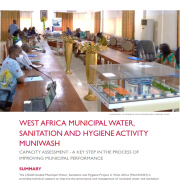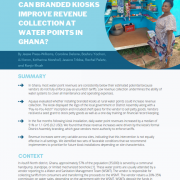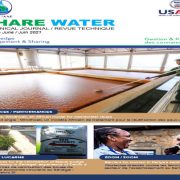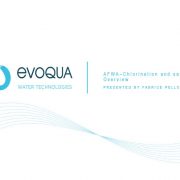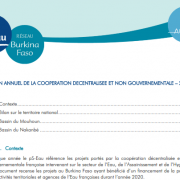USAID WA-WASH conducted a series of workshops to strengthen the capacity of policy makers on integrating climate risks and adaptation into water resource planning and management in Burkina Faso, Ghana, and Niger. The main objective was to ensure the mainstreaming of climate change into WASH policies and practices. Over 246 decision makers benefited from these trainings. Mr. Maliki Ouédraogo, one of participants, respectively participated as a representative of SOS Sahel International to an initial training in June 2013, and a refresher training in February 2015, on integrating climate change adaptation into development strategies. He is the Coordinator of the decentralized cooperation project between Dédougou (Burkina Faso) and the city of Douai (France). Based on the knowledge gained through the climate change trainings, Mr. Ouédraogo convinced the Special Delegation members (former municipality) of the commune of Dédougou to implement two reforestation projects. As a follow-up to the climate change trainings, Mr. Ouédraogo intends to help the population of the commune of Dédougou integrate climate change adaptation into their development actions and strategies. He organized a meeting with the members of the Special Delegation of the commune of Dédougou (see Photo 1). « The content of the training on climate change was the discussion topic with the members of the Special Delegation and village development committees (VDC) during the elaboration of the development plan of the municipality of Dédougou« . The presentation made by Mr. Ouédraogo, to the Special Delegation members and the leaders of various village development committees, brought awareness of the downside risks of climate change to their environment.
With soils conducive to the practice of agriculture and livestock, the Boucle du Mouhoun is one of the regions that benefit from a good rainfall in Burkina Faso. However there is an increased pressure on the environment in order to increase farmlands for agricultural production. This situation contributes to degrade the environment and compromise the living conditions of people. In some villages like Zéoulé and Kamendena, people do not hesitate to make a link between the gradual disappearance of orchard trees and the phenomenon of climate change. To cope with the effects of these changes, people from these villages initiated some micro reforestation projects.
At Kamendena, the village development committee (with the collaboration of teachers), implemented the « reforestation project at the primary school of Kamendena ». This project aims to plant 1,350 trees (fruit and medicinal trees) around the primary school. According to the executive members of the village development committee, this initiative has the advantage of also educating students about environemental protection and especially tree protection. As added benefit, selling the fruits collected from these trees will increase the income of the school management committee (COGES, in french). For the sustainability of this project, the village development committee organized the people into small groups that ensure the maintenance and monitoring of trees planted until the pupils take over at the beginning of the academic year. In the dry season, the presence of well-borehole in the school will facilitate the watering of plants. The village development committee of Zéoulé dug garden wells to ensure that plants are watered during the dry season due to the absence of such infrastructure in the vicinity of the project intervention area in this village (see Photo 2). Both village development committees have plans to replace the plants that will not survived beyond the first year.
To ensure the success of these two initiatives, the local authorities have committed to monitor its implementation. SOS Sahel International assured the management of the project and the municipality officer in charge of environmental matters conducted regular monitoring visits. To encourage emulation by other stakeholders, prizes will be granted by SOS Sahel International to the best reforestation sites according to its principle of « reforestation by contract ». The NGO introduced this practice in its climate chance adaptation strategies. This helps to improve plant survival rate which is over 70%. These two initiatives are funded by the project for decentralized cooperation between Dédougou (Burkina Faso) and the city of Douai (France) with a total budget of 900,000 CFA francs for the village of Zéoulé and 630,000 CFA francs for the village of Kamendena. The approach developed by Mr. Ouédraogo, based on the training he received from USAID WA-WASH, illustrates that from awareness campaigns supported by local authorities, communities can give more importance to climate change issues. This awarness raising is also a guarantee to the success of initiatives that could be developed in order to adapt to the effects of climate change.

